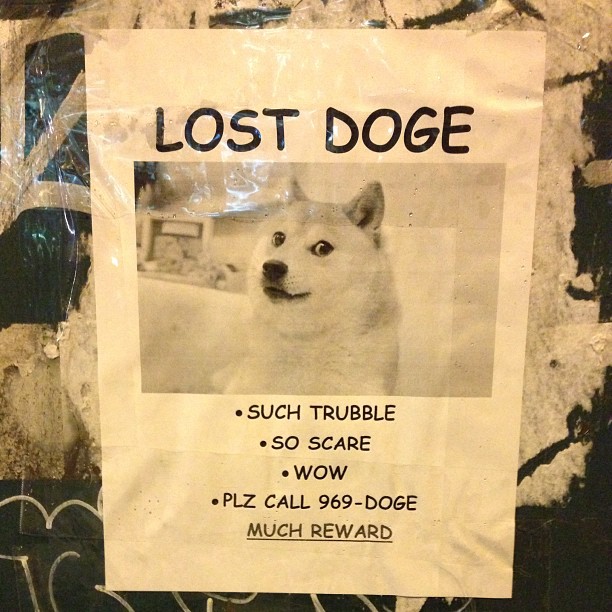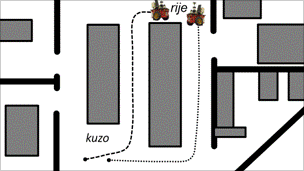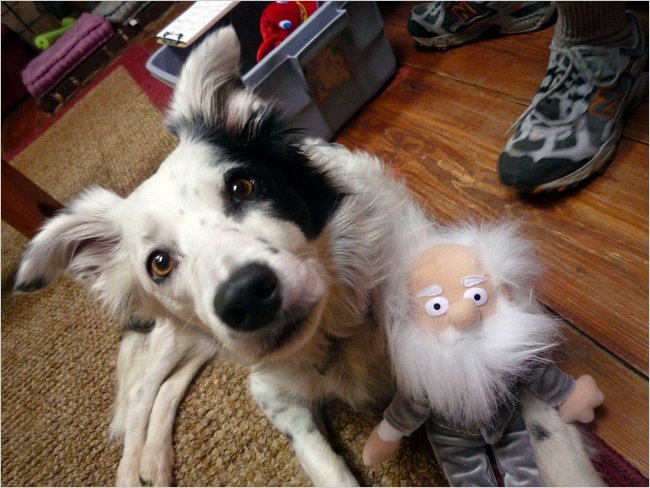
Wow. Such knowledge. Many Smarts: Linguist Gretchen McCulloch explains the grammatical principles of Doge. “What light. So breaks. Such east. Very sun. Wow, Juliet. What Romeo. Such why. Very rose. Still rose. Very balcony. Such climb.”
Haunting the Web Since 1999

Wow. Such knowledge. Many Smarts: Linguist Gretchen McCulloch explains the grammatical principles of Doge. “What light. So breaks. Such east. Very sun. Wow, Juliet. What Romeo. Such why. Very rose. Still rose. Very balcony. Such climb.”

I’m from The Future, you should move to China: Forbes’ Bruce Upbin examines a theoretically quick and easy way to learn Chinese characters…or, at least, a few of them. “There are some 10,000 Chinese characters in common use. Basic literacy, according to the Chinese government, starts at two thousand characters. A solid grasp of a daily Beijing newspaper requires knowing around three thousand. An erudite Chinese reader should recognize five to seven thousand characters. How about eight?

In the most recent chapter of “Haven’t these scientists ever heard of Skynet?”, researchers at the University of Queensland are teaching robots to forge their own mutually-agreed-upon language. “Slowly, as the robots travel and talk, they narrow down their lexicon of place names until a mutual gazeteer of their world has been generated. The robots generated place names such as ‘kuzo’, ‘jaro’ and ‘fexo.’“

As it happens, the iPad wasn’t the only modern technology predicted by Douglas Adams. Researchers at Georgia Tech and the Wild Dolphin Project develop a machine that will (hopefully) speak dolphin — or at least speak at dolphins. Says a skeptic: “‘Imagine if an alien species landed on Earth wearing elaborate spacesuits and walked through Manhattan speaking random lines from The Godfather to passers-by.’”
Not that any more egregious timesucks are needed ’round these parts at the moment, but in case you find yourself with a free quarter-hour or three: Kris at Webgoddess recently pointed the way toward a fun movie-hangman game, Famous Objects from Classic Movies. (Most are pretty easy, although I’ll admit to having googled for a swing set.)
And, if that doesn’t do you, their constant begging for a subscription fee can’t kill the crack-like entertainment value of Lumosity’s addictively addictive Word Bubble game, sent to me by a co-worker. (My current high score is 4320, although that is after a lot of playing. When I first started, breaking 2000 was a good game.)

The NYT tells the tale of Chaser, a border collie with a vocabulary of over 1000 words now. “Dr. Pilley said that most border collies, with special training, ‘could be pretty close to where Chaser is.’…Dr. Horowitz agreed: ‘It is not necessarily Chaser or Rico who is exceptional; it is the attention that is lavished on them,” she said.’” (Sorry, Berk…At least I taught you bacon and tacos — you know, the important stuff.)
“Lemmings do not engage in suicidal dives off cliffs when migrating. They will, however, occasionally, and unintentionally fall off cliffs when venturing into unknown territory…The misconception is due largely to the Disney film White Wilderness, which shot many of the migration scenes (also staged by using multiple shots of different groups of lemmings) on a large, snow-covered turntable in a studio. Photographers later pushed the lemmings off a cliff.“
LMG points the way to an interesting list of common misconceptions over at Wikipedia. “The Inuit do not have a large number of words for snow. One Eskimo-Aleut language studied had four unrelated root words…By comparison, English has many unrelated root words for snow as well: snow, sleet, powder, flurry, drift, avalanche and blizzard.“
“Lisa Bonet ate no basil, Warsaw was raw. Was it a car or a cat I saw? Rise to vote, sir. Do geese see God? ‘Do nine men interpret?’ ‘Nine men,’ I nod.” By way of THND, Weird Al Yankovic channels Dylan through palindromes, in the manner of “Subterranean Homesick Blues,” I’m Not There, and “Royal Jelly.” (McCain palindrome via here.)
|
There is a reason that Obama recently spoke of Reagan. Reagan understood that you win elections by drawing support from independents and the opposite side. He understood what unified the country so that he could lead it according to his vision.
Obama understands the importance of values, connection, authenticity, trust, and identity. But his vision is deeply progressive. He proposes to lead in a very different direction than Reagan. Crucially, he adds to that vision a streetwise pragmatism: his policies have to do more than look good on paper; they have to bring concrete material results to millions of struggling Americans in the lower and middle classes. They have to meet the criteria of a community organizer. The Clintonian policy wonks don’t seem to understand any of this. They have trivialized Reagan’s political acumen as an illegitimate triumph of personality over policy. They confuse values with programs. They have underestimated authenticity and trust… This nomination campaign is about much more than the candidates. It about a major split within the Democratic party. The candidates are reflecting that split. Here are three of the major “issues” dividing Democrats. First, triangulation: moving to the right — adopting right-wing positions — to get more votes. Bill Clinton did it and Hillary believes in it. It is what she means by “bipartisanship.” Obama means the opposite by “bipartisanship.” To Obama, it is a recognition that central progressive moral principles are fundamental American principles. For him, bipartisanship means finding people who call themselves “conservatives” or “independents,” but who share those central American values with progressives. Obama thus doesn’t have to surrender or dilute his principles for the sake of “bipartisanship.” The second is incrementalism: Hillary believes in getting lots of small carefully crafted policies through, one at a time, step by small step, real but almost unnoticed. Obama believes in bold moves and the building of a movement in which the bold moves are demanded by the people and celebrated when they happen. This is the reason why Hillary talks about “I,” I,” “I” (the crafter of the policy) and Obama talks about “you” and “we” (the people who demand it and who jointly carry it out). The third is interest group politics: Hillary looks at politics through interests and interest groups, seeking policies that satisfy the interests of such groups. Obama’s thinking emphasizes empathy over interest groups. He also sees empathy as central to the very idea of America. The result is a positive politics grounded in empathy and caring that is also patriotic and uplifting. For a great many Democrats, these are the real issues. These real differences between the candidates reflect real differences within the party. Whoever gets the nomination, these differences will remain. It is time for the press, the pundits, the pollsters, and the political scientists to take these issues seriously. |
Linguist and cognitive scientist George Lakoff — also the recent author of Don’t Think of an Elephant — attempts to explain what he sees as the crucial differences between Clinton and Obama.
Blah Blah Blah Berkeley…Scientists in Hungary have apparently developed a computer program that speaks basic canine. “After analyzing digital versions of the barks, overall the computer program correctly identified the kinds of barks the dogs made 43 percent of the time — about the same as humans’ 40 percent…The software identified ‘walk’ and ‘ball’ barks better than people, although people identified ‘play’ and ‘alone’ barks better than the software.“
Hmm. I don’t want to dismiss the advance of science, but that’s a pretty low success rate. (And I’d wager most dog owners can get the thread of their own pet’s barking more often than 40% of the time.) More interestingly, though, “‘I’m pretty sure this could work with any animal vocal signals,’ Molnár told LiveScience” So, when the Dolphin Wars start, you’ll know why.
Which reminds me, longtime readers may remember that Berk and I were part of the test group for the American release of the Bowlingual. Alas, that version of this technology wasn’t really ready for primetime.